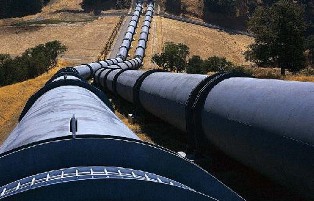
Azerbaijan’s SOCAR Interested in Buying a Stake in Georgia’s Oil & Gas Corporation
Publication: Eurasia Daily Monitor Volume: 13 Issue: 191
By:

The finance minister of Georgia, Dimitri Kumsishvili, recently announced that the Georgian government is considering selling a 25 percent stake in the state-owned Georgian Oil & Gas Corporation (GOGC) on the international stock exchange in 2017 (Cbw.ge, November 30). Meanwhile, Azerbaijan’s State Oil Company (SOCAR) disclosed its interest in obtaining a share in Georgia’s GOGC, if a tender is officially announced (Trend, November 28). Acquiring a share in GOGC is of high significance for SOCAR, because Georgia hosts the Baku-Tbilisi-Ceyhan and Baku-Supsa oil pipelines and the South Caucasus Gas Pipeline, the volume of which will be doubled from the Shah-Deniz Stage II. GOGC also operates the North-South gas pipeline, which stretches from the Georgian-Russian border to the Georgian-Armenian border and supplies Georgia and Armenia with natural gas (See Gogc.ge). Speculation has been swirling around that if SOCAR purchases a stake in GOGC, it would be able to control the North-South gas pipeline too, which is of great concern to Armenia.
Similar trends were observed back in 2005, when the Georgian government under Mikheil Saakashvili was holding talks with Russia for the sale of the Georgian section of the North-South gas pipeline to Gazprom for $300 million. By purchasing the Georgian section of the pipeline, Gazprom could have interconnected and controlled the gas transmission systems of both Georgia and Armenia. Additionally, this would have given it also direct access to Iran, because the gas transmission system of Armenia is fully owned by Gazprom. However, Washington objected to the sale, expressing concern that it would have increased Georgia’s energy dependence on Russia. The sale of the pipeline to Russia was delayed by US political intervention and the simultaneous allocation of $70 million within the framework of the US Millennium Challenge Corporation for the rehabilitation of the North-South gas pipeline. Under that agreement, Georgia undertook the obligation not to sell the pipeline for five years, until April 2011.
Nevertheless, in March 2006, the Georgian government reiterated its intention to sell the pipeline to Gazprom in return for a binding agreement to postpone the planned price increase of Russian gas from $110 to $230 per 1,000 cubic meters. Reportedly, Russia’s Gazprom had offered $250 million for the acquisition of the pipeline, but the Georgian government set the price at $1 billion. Subsequently, in September 2008, Georgia received additional funding from the Millennium Challenge Corporation for the second stage of the pipeline rehabilitation (Rferl.org, July 9, 2010; Civil.ge, July 6, 2010; Kommersant.ru and Georgia-news.org, October 20, 2015).
In 2010, the same question was raised again, when Azerbaijan’s SOCAR expressed interest in purchasing a stake in the Georgian section of the Russia-Armenia pipeline and had allegedly offered the Georgian government $500 million (Azernews.az, August 23, 2010). Prior to that, the Georgian parliament passed a draft law in July 2010 removing the North-South gas pipeline from the list of strategic state assets and stripping any restrictions on its sale. Parliament proposed a provision in the draft law, which would allow for the sale of no more than 49 percent of the pipeline, out of concern that Russia might try to obtain a majority stake. However, the ruling party rejected the proposal by arguing that it was an economic matter, fully corresponding with the government’s policy of supporting a free and liberalized market, and thus should not be politicized (Civil.ge, July 6, 2010).
Armenia, which receives the major share of its gas supply from Russia via the North-South gas pipeline, was concerned that Azerbaijan’s SOCAR could purchase the pipeline and would be able to block gas deliveries from Russia to Armenia. Although Armenia imports natural gas from Iran as well, the country is still heavily reliant on Russian gas supplies. Consequently, Armenia insisted that Georgia would not sell the pipeline to Azerbaijan. Georgia’s former Prime Minister Nika Gilauri had said that the Georgian government would not sell the controlling stake in the pipeline and, by only selling a minority share, it would remain its principal owner. In 2011, Georgia’s former Energy Minister Aleksandr Khetaguri announced Tbilisi’s intention to sell a minority stake (25 percent) in the pipeline on the stock exchanges in New York, London and Warsaw (Asbarez.com, August 11, 2011; August 24, 2010). In 2015, Georgia’s current Energy Minister Kakha Kaladze reiterated that Georgia was not going to sell this pipeline, notably to Gazprom, due to its strategic importance (Georgia-news.org, October 8, 2015). Otherwise, Georgia would be left without political and economic leverage in its relations with Russia.
If SOCAR buys a 25 percent stake in GOGC, it will have a voice in the operation of Georgia’s natural gas transmission system, and subsequently in the international cross-border gas transit, either from Russia or potentially from Iran (via Armenia). However, SOCAR will not be a holder of the controlling stake. Even if Azerbaijan could gain strategic leverage over Armenia by purchasing the Georgian section of the North-South gas pipeline, Baku is not likely to cut off gas supplies through the pipeline. Despite Armenia’s concern, SOCAR will not be going against the terms of the intergovernmental agreement on gas transit from Russia to Armenia via Georgia for political reasons; otherwise, it would render the Georgian government responsible before the terms of IGA. Since Russia’s gas export is at stake, Azerbaijan would probably not confront Russia. Moreover, while the strategic value of the pipeline remains undisputed, the economic gains of SOCAR would not be significant. As Georgia receives a 10 percent transit fee in the form of natural gas (but not in cash) from Russian gas export to Armenia, the operation of the pipeline would be conducted at SOCAR’s own cost.



